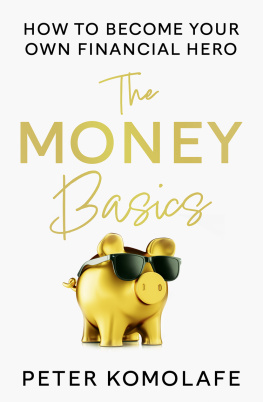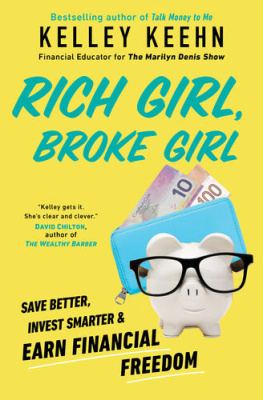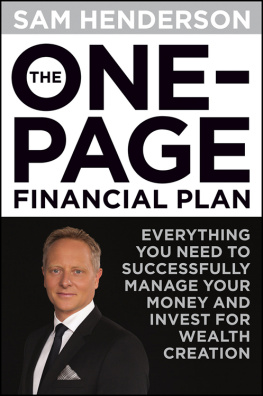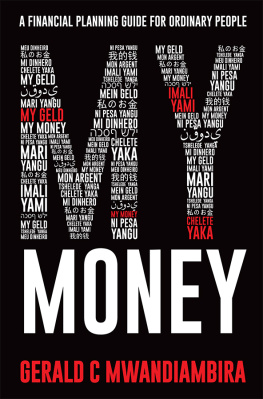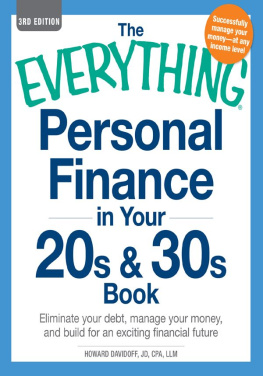HarperCollinsPublishers
1 London Bridge Street
London SE1 9GF
www.harpercollins.co.uk
HarperCollinsPublishers
Macken House, 39/40 Mayor Street Upper
Dublin 1, D01 C9W8, Ireland
First published by HarperCollinsPublishers 2023
FIRST EDITION
Peter Komolafe 2023
Cover layout design HarperCollinsPublishers 2023
Cover photograph: Shutterstock.com
A catalogue record of this book is available from the British Library
Peter Komolafe asserts the moral right to be identified as the author of this work
While every effort has been made to trace the owners of copyright material reproduced herein and secure permissions, the publishers would like to apologise for any omissions and will be pleased to incorporate missing acknowledgements in any future edition of this book.
All rights reserved under International and Pan-American Copyright Conventions. By payment of the required fees, you have been granted the nonexclusive, non-transferable right to access and read the text of this e-book on screen. No part of this text may be reproduced, transmitted, downloaded, decompiled, reverse engineered, or stored in or introduced into any information storage retrieval system, in any form or by any means, whether electronic or mechanical, now known or hereinafter invented, without the express written permission of HarperCollins e-books.
Find out about HarperCollins and the environment at
www.harpercollins.co.uk/green
Source ISBN: 9780008620356
Ebook Edition March 2023 ISBN: 9780008620363
Version: 2023-02-10
This ebook contains the following accessibility features which, if supported by your device, can be accessed via your ereader/accessibility settings:
- Change of font size and line height
- Change of background and font colours
- Change of font
- Change justification
- Text to speech
- Page numbers taken from the following print edition: ISBN 9780008620356
This book is dedicated to you, the reader. Your success in life is my mission. My hope is that your journey with money will be smooth and prosperous.
The language of personal finance has always been full of jargon and technical terms, making some things that should be simple difficult to understand. You can read the book from cover to cover or select a section you want to study in more depth.
If youre looking for an easy way to get your bearings in personal finance, the following list of terms will help familiarise you with some basic concepts and terminology related to money and investments covered in this book.
If youre going to take control of your financial future and become your own financial hero, you need to understand the language used in finance. It will initially seem alien, but I promise as you grow in confidence it will become part of your vocabulary. The terms below are used every day by professional investors and ordinary people like you. Feel free to refer back to them as you please.
Appreciation
Appreciation is an increase in the value of an asset, like a home. Appreciation can be measured by comparing the current market value of the asset to its original cost. For example, if you bought a house for 200,000 and its now worth 400,000 after five years, its clearly appreciated in value.
APR
APR stands for annual percentage rate, which determines how much interest will be paid on a credit facility like a credit card. Its the official rate used to help you understand the cost of borrowing. It includes any fees or additional costs incurred to set up the facility.
Asset
An asset is anything your own that has value and can increase (appreciate) in value over time. An asset could include property, jewellery, artwork, investments or precious metals such as gold, silver and platinum.
Balance transfer
A balance transfer is a type of credit card transaction that moves a balance from one credit card to another. Typically, the balance being transferred is held on a credit card from a different credit card issuer with an introductory period when the balance transfer attracts no interest for an agreed time.
Bankruptcy
Bankruptcy is a legal proceeding initiated when a person or business cannot repay outstanding debts or obligations.
Central bank
A central bank is a bank that controls the money supply in a country. It usually sets interest rates and decides how much money to print. The Bank of England, Federal Reserve and European Central Bank are examples of central banks in the United Kingdom, United States and Europe, respectively.
Collateral
Something pledged as security for repayment of a loan, which can and will be forfeited in the event of a default.
Compound interest
Compound interest is when the interest you earn on your money earns interest on itself. For example, you deposit 100 into an account, and one year later, your 100 is now 110. In year two, you will earn interest on 110 instead of your original 100.
Consolidation
Consolidation is a way of merging your existing debts into one convenient monthly payment. This can be a good option when you have multiple debts (for example, on credit cards or overdrafts) that you wish to pay off within a more defined timeframe.
Credit report
Your credit report is a digital record of your financial history. It contains records of all your debts, your payment history, including missed and late payments, county court judgments and other court records registered against you. The information in your report is used to derive your credit score.
Credit score
A credit score is a number that shows the likelihood that you will pay back the money you borrow. Lenders use credit scores to determine whether to accept your application for credit facilities such as personal loans, mortgages or car loans. They also use your score to determine what interest rate to offer you.
Cryptocurrency (crypto)
A cryptocurrency is a digital or virtual currency that uses cryptography to secure its transactions. A cryptocurrency is difficult to counterfeit because of this security feature. Cryptocurrencies are not legal tender. No government or central bank currently backs them. Cryptocurrencies can be used to buy goods and services privately using peer-to-peer transactions, but they have to be exchanged for physical money first if you want to use them in the real world.
Debt
Debt is a loan of money that carries an obligation of repayment. It is a liability.
Debt prioritisation
Debt prioritisation is a way to decide which debts to pay first when you have multiple debts.
Debt relief orders
Debt relief orders (DROs) are a way of legally avoiding bankruptcy. Theyre designed for people with debts of less than 20,000 who cant afford to pay them back. A DRO lasts for three years; during that time, your creditors cant continue taking court action against you because they wont be able to get payment. If someone applies for a DRO and doesnt have enough money to repay their debts in full, they will have to make monthly payments once the order is granted these payments are set at an affordable level for the person applying for it.
Depreciation
Depreciation is when an asset falls in value.
Forex
Forex stands for foreign exchange, which refers to the foreign exchange market, a global marketplace for trading one nations currency for another for example, trading the British pound for the US dollar or the euro.
FTSE 100
This is an index that tracks the performance of the 100 largest companies on the London Stock Exchange. The FTSE 100 is a good indicator of how the UK economy is doing and can be used as a benchmark for measuring the health of UK businesses.

